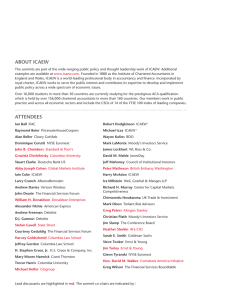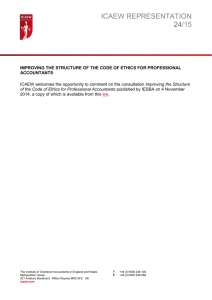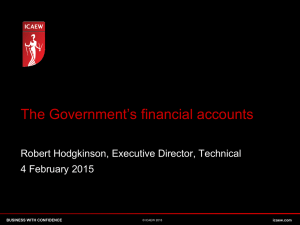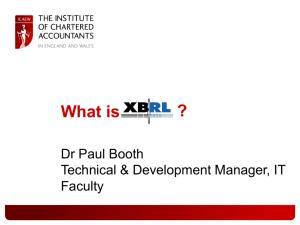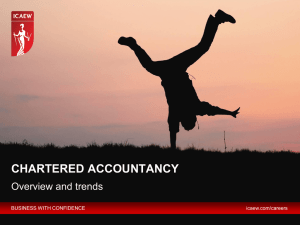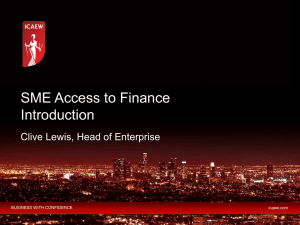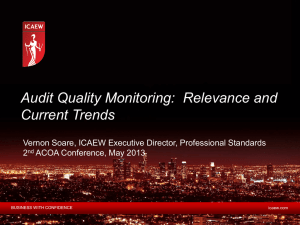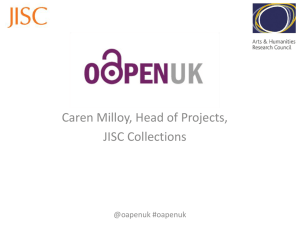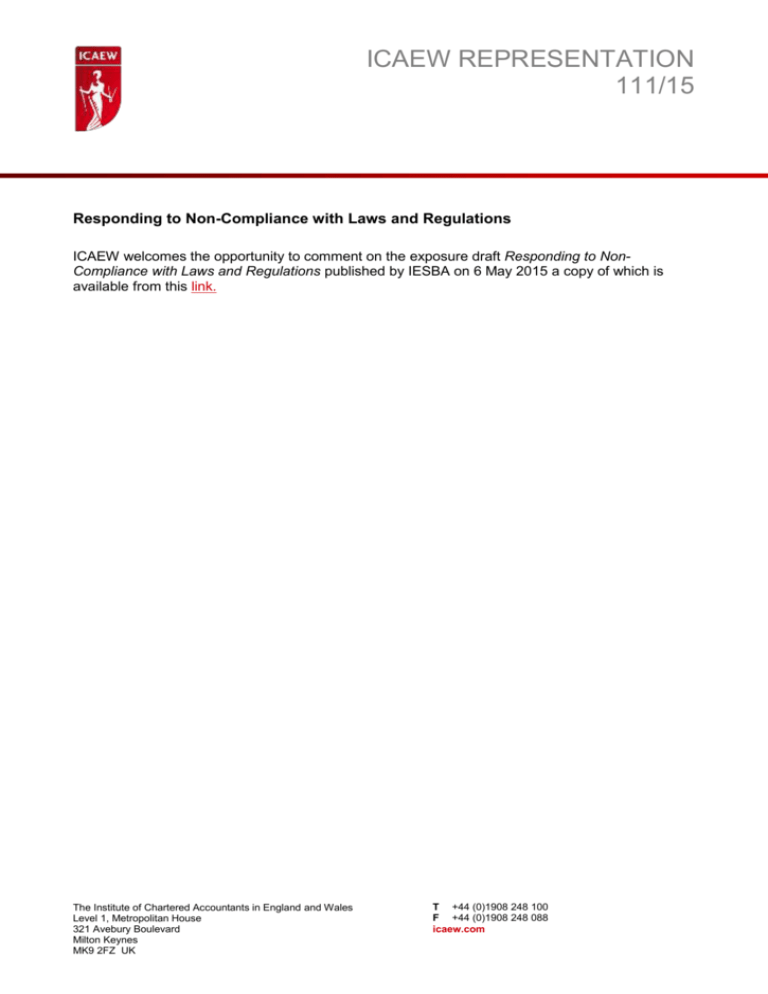
ICAEW REPRESENTATION
111/15
Responding to Non-Compliance with Laws and Regulations
ICAEW welcomes the opportunity to comment on the exposure draft Responding to NonCompliance with Laws and Regulations published by IESBA on 6 May 2015 a copy of which is
available from this link.
The Institute of Chartered Accountants in England and Wales
Level 1, Metropolitan House
321 Avebury Boulevard
Milton Keynes
MK9 2FZ UK
T +44 (0)1908 248 100
F +44 (0)1908 248 088
icaew.com
ICAEW is a world-leading professional accountancy body. We operate under a Royal Charter,
working in the public interest. ICAEW’s regulation of its members, in particular its responsibilities in
respect of auditors, is overseen by the UK Financial Reporting Council. We provide leadership and
practical support to over 144,000 member chartered accountants in more than 160 countries,
working with governments, regulators and industry in order to ensure that the highest standards
are maintained.
ICAEW members operate across a wide range of areas in business, practice and the public sector.
They provide financial expertise and guidance based on the highest professional, technical and
ethical standards. They are trained to provide clarity and apply rigour, and so help create long-term
sustainable economic value.
Copyright © ICAEW 2015
All rights reserved.
This document may be reproduced without specific permission, in whole or part, free of charge and
in any format or medium, subject to the conditions that:
it is appropriately attributed, replicated accurately and is not used in a misleading context;
the source of the extract or document is acknowledged and the title and ICAEW reference
number are quoted.
Where third-party copyright material has been identified application for permission must be made
to the copyright holder.
For more information, please contact [include faculty, department or default email address:
representations@icaew.com ]
icaew.com
ICAEW Representation 111/15 Responding to Non-Compliance with Laws and Regulations
MAJOR POINTS
General Matters
1.
Where law or regulation requires the reporting of identified or suspected NOCLAR to an
appropriate authority, do respondents believe the guidance in the proposals would
support the implementation and application of the legal or regulatory requirement?
We are generally supportive of the revised guidance contained in the latest exposure draft,
which we believe strikes a good balance between competing interests. However, the existence
of domestic law and regulation in this area would override (and negate the need for) additional
guidance in the Code of Ethics in many (possibly most) countries. The IESBA Code should not
override laws and regulations and that must be made clear. The legal requirements of the
jurisdiction should be the first consideration and this guidance interpreted in light of them.
We are pleased that mandatory reporting is no longer being considered as we believe that
would have resulted in unintended and adverse consequences, potentially reducing the ability
of accountants to influence potential non-compliance.
We are also pleased that disclosure is precluded where there is a conflict with local laws and
regulations, an example being tipping off concerns under AML legislation where a discussion
with management may not always be lawfully appropriate in such cases.
We are conscious that there may be certain territories where domestic legislation on
professional secrecy might make wider disclosure difficult so this will have to be subject to
prevailing legal requirements.
2.
Where there is no legal or regulatory requirement to report identified or suspected
NOCLAR to an appropriate authority, do respondents believe the proposals would be
helpful in guiding PAs in fulfilling their responsibility to act in the public interest in the
circumstances?
Our understanding of the public interest concept is that the responsibility to act in the public
interest rests with the profession as a whole which will develop such requirements with the
public interest in mind. Therefore individual accountants discharge that obligation by following
the requirements of the professional codes.
In this context it is apparent that the exposure draft has been developed with public interest
considerations in mind. Clearly, given the framework adopted, some criteria needs to be
adopted for accountants to decide when to override confidentiality and make disclosure, and it
is not unexpected for the public interest to be used as the basis of such criteria. However we
believe it is important not to suggest that some separate obligation to act in the public interest
rests with the individual accountant.
Furthermore, no consistent definition of public interest exists and the term is often misused.
The concept has not been developed fully enough to overcome issues of subjectivity and
differing approaches internationally. The concept should therefore not be used too liberally
without detailed criteria as to how it can be assessed. Care should also be taken to avoid the
phrase being used as a way of extending general law enforcement responsibilities to the
profession.
3.
The Board invites comments from preparers (including TCWG), users of financial
statements (including regulators and investors) and other respondents on the practical
aspects of the proposals, particularly their impact on the relationships between:
(a) Auditors and audited entities;
3
ICAEW Representation 111/15 Responding to Non-Compliance with Laws and Regulations
We would hope that the effect on audits carried out under ISAs would be negligible given the
existing requirements under ISA 250. However care should be taken not to go too far beyond
the requirements of current ISAs. Particular difficulties could arise in having a requirement to
consider NOCLAR that may occur. Under current ISAs the only area where an auditor is
required to look to the future is in respect of going concern, a well-developed concept which is
more widely understood. The exposure draft, on the other hand, requires such foresight in
respect of whether or not NOCLAR will occur that results in substantial harm (see our
comment in paragraph 8), which is significantly more subjective and subtle than the going
concern concept, and in its infancy as a threshold in the Code of Ethics.
Difficulties may also arise where the auditor is required to prompt management to take further
action. If the auditor is expected to prompt or encourage management to address a particular
issue then this could easily be construed as advice. Where such advice is given on a matter
which goes beyond simply addressing a material misstatement then it becomes general
business advice and the auditor may be in danger of involvement in the running of the
business. Not only does this present immediate issues with regard to independence but they
could also be in a position where they are auditing the results or consequences of that advice
in the following year.
Additionally the auditor may be accused of providing advice extending beyond their area of
expertise, resulting in liability issues.
Please also see our comments on public interest in paragraph 2.
(b) Other PAs in public practice and their clients; and
Whilst the additional clarity over the expectations placed upon members of IFAC bodies is
welcome, the need to maintain our reputation as a profession of trusted advisers should be
emphasised. It is in the public interest for persons to have access to advice and representation
without the risk that information concerning their affairs will be unnecessarily disclosed to
parties outside the professional relationship. Such sensitivity might be particularly important in
engagements involving, for example, forensic services. Furthermore, whilst the proposed
guidance is clearer on domestic legislation taking precedence, the weight to be attached to
contract law is less clear.
(c) PAIBs and their employing organizations.
For a PAIB there may be difficulties in deterring prospective rule breaking. This should be
limited to explaining the expected breach and its consequences; the effective delivery of good
advice. It should not, for example, involve usurping the rights of management by filing correct
returns to supersede false ones. Whilst good professional judgement should mitigate the
likelihood of the latter it is not explicit in the exposure draft that deterrence should not in itself
involve subversive and possibly unprofessional behaviour itself.
RESPONSES TO SPECIFIC QUESTIONS
Specific Matters
Q1: Do respondents agree with the proposed objectives for all categories of PAs?
4. .We are broadly supportive of the proposed objectives for the categories of professional
accountant, subject to our comments above regarding deterring breaches and heavy handed
usage of the nebulous concept of public interest. Clearly, given the framework adopted, some
criteria need to be adopted for accountants to decide when to override confidentiality and
make disclosure, and it is not unexpected for the public interest to be used as the basis of such
4
ICAEW Representation 111/15 Responding to Non-Compliance with Laws and Regulations
criteria. However we believe it is important not to suggest that some separate obligation to act
in the public interest rests with the individual accountant.
Q2: Do respondents agree with the scope of laws and regulations covered by the proposed
Sections 225 and 360?
5. We are supportive of the approach to deciding which laws and regulations are relevant. An
accountant cannot be expected to be an expert in legal matters. However it is not
unreasonable that they understand their client’s operating environment and therefore the key
regulatory frameworks, failure to adhere to which could make or break the business.
Q3: Do respondents agree with the differential approach among the four categories of PAs
regarding responding to identified or suspected NOCLAR?
6.
We are broadly supportive of the proposed categories of PA and the guidance for each.
It should be noted that audit is often a state mandated legislative requirement within which
practitioners have, not only statutory obligations, but also requirements under auditing
standards such as ISAs to which to adhere. The requirements of the exposure draft appear to
underpin this and it would be difficult to justify extending similar requirements to those
providing non audit services the output of which is defined by private contractual agreement.
7.
We foresee difficulties in distinguishing a Senior PAIB (director, officer or senior employee
capable of exerting significant influence) from an Other PAIB. There may be a risk that an
over-zealous regulator, with the benefit of hindsight, may adopt a form over substance
approach in an effort to assign additional responsibilities on a particular individual.
Q4: With respect to auditors and senior PAIBs:
(a) Do respondents agree with the factors to consider in determining the need for, and
the nature and extent of, further action, including the threshold of credible evidence
of substantial harm as one of those factors?
8. Further thought is required over the concept of ‘substantial harm’ derived from SEC
regulations. We have concern that this is a new concept for the Code, adapted from a welldeveloped code of conduct but one grounded firmly in a regulatory environment. There is
therefore a danger that where clarity is sought as to whether a matter constitutes substantial
harm, the only useful precedents available will be those developed under a regulatory lens.
This may be unsuitable in attempting to apply a principles based code.
9.
Some original examples of ‘serious adverse consequences’ might therefore be useful, and it
may be that material misstatement will not always have serious adverse consequences.
(b) Do respondents agree with the imposition of the third party test relative to the
determination of the need for, and nature and extent of, further action?
10. Many accountants will be familiar with such a test. For example, it is explicit in the relevant
sections on safeguards (110.2) and independence (290.6). However it should be noted that in
both these examples, considering the perception of a reasonably informed third party is an
integral part of a threats and safeguards approach. The exposure draft is instead dealing with
specific guidance on unique situations where there may be a need to override a fundamental
principle. This is a very different analytical context.
(c) Do respondents agree with the examples of possible courses of further action? Are
there other possible courses of further action respondents believe should be
specified?
11. No list of examples in this area can ever be exhaustive, nor should it be. IESBA might consider
putting such examples in an appendix to facilitate future review and update.
5
ICAEW Representation 111/15 Responding to Non-Compliance with Laws and Regulations
(d) Do respondents support the list of factors to consider in determining whether to
disclose the matter to an appropriate authority?
12. It should be clear that the Code of Ethics is principles based and the list of factors to consider
in determining whether to disclose does not replace professional judgement. It should also be
clearer that where there is an appropriate body to receive the information that the specific
reporting route of that body should be used.
Q4: For PAs in public practice providing services other than audits, do respondents agree
with the proposed level of obligation with respect to communicating the matter to a network
firm where the client is also an audit client of the network firm?
13. We are conscious that there may be certain territories where domestic legislation on
professional secrecy might make this difficult so this will have to be subject to prevailing legal
requirements. The exposure draft generally gives little guidance on how to deal with cross
border engagements and this could be considered a shortcoming.
Q5: Do respondents agree with the approach to documentation with respect to the four
categories of PAs?
14. We support the respective recommendations regarding documentation.
6

